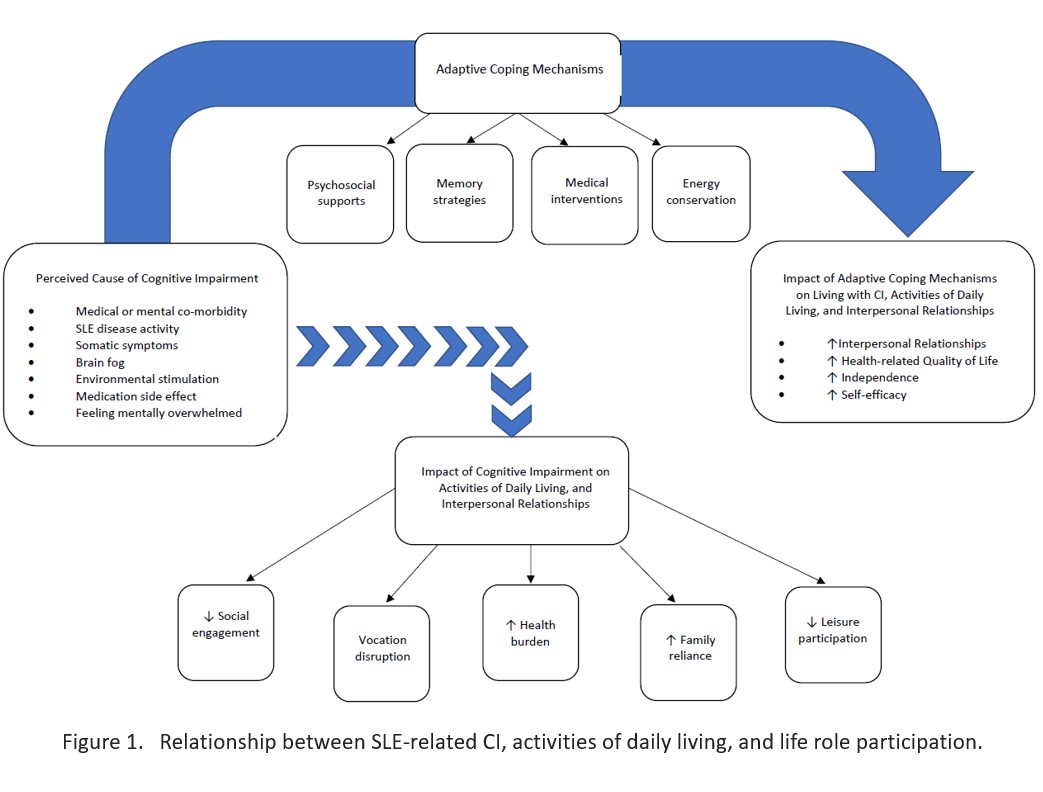Session Information
Date: Tuesday, November 14, 2023
Title: (2257–2325) SLE – Diagnosis, Manifestations, & Outcomes Poster III
Session Type: Poster Session C
Session Time: 9:00AM-11:00AM
Background/Purpose: Cognitive impairment (CI) in systemic lupus erythematosus (SLE) negatively impacts health-related quality of life leading to activity limitations. This qualitative study aimed to (1) explore the effect of SLE-related CI on activities of daily living and life role participation; and (2) describe factors influencing activity restriction and life role participation.
Methods: Semi-structured, in-depth interviews probing living with CI in SLE were conducted with 24 adults living with SLE. Sociodemographic and clinical data, objective cognitive function (ACR-NB), and subjective cognitive function (PDQ-20) were collected. Participants were categorized into four groups of CI to perform a qualitative thematic analysis guided by a framework analytical approach. The groupings were defined as objective and subjective CI (Group 1), objective CI (Group 2), subjective CI (Group 3), and no CI (Group 4). Themes emerged using both inductive and deductive methods of data analysis.
Results: All participants met ACR classification criteria for SLE with a mean age of 42 ±13 years, SLE disease duration 13 ±10 years, SLEDAI (disease activity index) of 2.2 ±2.5, SDI (disease damage index) of 1.0±1.3, and prednisone daily dose of 3.4 mg/d ±6.0. Group sample sizes consisted of 11 participants in group 1, five in group 2, six in group 3, and 2 in group 4. Participants reported ongoing problems in multiple cognitive domains (memory, language, etc.) with multiple perceived causes. CI was felt to impact work, social, domestic and family life, health, and independence. Five overarching themes were represented in the data: (1) characterization of SLE-reported CI; (2) perceived cause of CI; (3) perceived impact of CI on activities of daily living and life role participation (4) adaptations for managing CI; (5) influence of CI adaptations on activities of daily living and life role participation. Figure 1 summarises the five identified themes and how they interact.
There were few between-group descriptive differences in the themes that emerged from the thematic and framework analyses. However, those within a subjective CI group (either group 1 or 3) characterized the involvement of mental health difficulties in perpetuating or exacerbating their self-reported experience of CI. Those within a subjective CI group also employed more frequent and diverse adaptations to manage their mental health difficulty, which had a secondary effect on their experience of CI.
Conclusion: This study provides a better understanding of the patient experience of CI in SLE, how it impacts their lives, and what coping strategies they employ. It highlights the long-term challenges those with CI in SLE undergo and provides evidence for the urgent need to implement multidisciplinary treatment options. The lack of descriptive differences between the study’s CI groupings suggests that regardless of the “type” of CI defined, subjective or objective, the impact and challenges experienced by the patients remain the same.
When managing CI, it may be beneficial to evaluate and understand available psychosocial support resources to help identify and reinforce relevant adaptations to improve health-related quality of life.
To cite this abstract in AMA style:
Barraclough M, Howe A, Soberanis A, Kakvan M, Chattu V, Bani-Fatemi A, Engel L, Vitti M, Nalder E, Groverover Y, Gignac M, Bonilla D, Nielsen W, Anderson N, Tartaglia C, Nowrouzi-Kia B, Touma Z. The Effects of Systematic Lupus Erythematosus Related Cognitive Impairments on Activities of Daily Living and Life Role Participation: A Qualitative Framework Study [abstract]. Arthritis Rheumatol. 2023; 75 (suppl 9). https://acrabstracts.org/abstract/the-effects-of-systematic-lupus-erythematosus-related-cognitive-impairments-on-activities-of-daily-living-and-life-role-participation-a-qualitative-framework-study/. Accessed .« Back to ACR Convergence 2023
ACR Meeting Abstracts - https://acrabstracts.org/abstract/the-effects-of-systematic-lupus-erythematosus-related-cognitive-impairments-on-activities-of-daily-living-and-life-role-participation-a-qualitative-framework-study/

